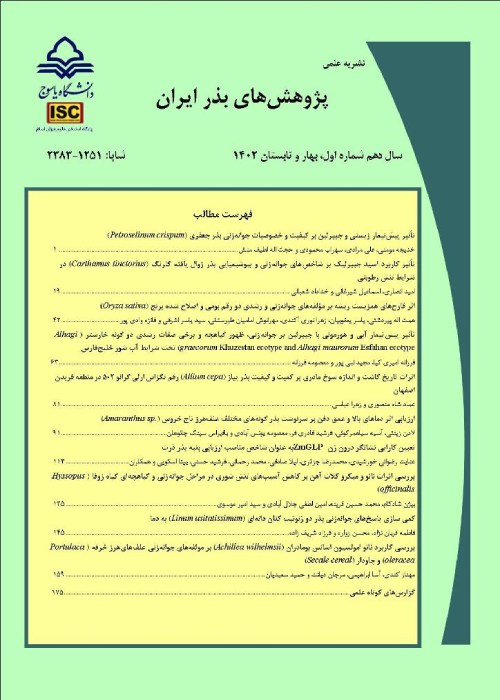Effect of Stevia (Stevia rebaudiana) Seed Priming Treatments with Salicylic Acid, Iron, and Zinc on Some Germination Traits and Photosynthetic Pigments under Drought Stress
Stevia (Stevia rebaudiana Bert.) is a herbaceous perennial plant that belongs to the family of Asteraceae. Stevia is a self-incompatible herb and the seeds resulting from this plant have low germination ability. Steviol glycosides found in this plant are 250-300 times sweeter than sucrose and despite their sweet flavor; they are not absorbed by the body. In general, the poor germination capacity of Stevia seeds is a major impediment for its large-scale cultivation. Priming is one of the seed enhancement techniques that could lead to an increase of germination percentage and germination rate under stress conditions. Therefore, the present study was conducted to evaluate the impact of priming with salicylic acid (SA), iron (Fe) and zinc (Zn) on some germination indices, seedling growth as well as the content of photosynthetic pigments in Stevia under normal and drought stress conditions.
A factorial experiment using a completely randomized design was carried out in the Seed Science and Technology Laboratory of Agricultural College, Shahed University, in 2017. The factors studied comprised four levels of drought stress (0, –0.3, –0.6 and –0.9 MPa) and seven priming combinations with SA, Fe and Zn. Non-primed seeds (dry seeds) were also considered as control. In this experiment, Fe and Zn were supplied by sources of iron (II) sulfate heptahydrate (FeSO4.7H2O, 0.5%) and Zinc sulfate heptahydrate (ZnSO4.7H2O, 0.5%), respectively. The traits examined in this study included germination percentage, radicle length, plumule length, seedling weight vigor index and the content of photosynthetic pigments and carotenoid.
The results of this experiment indicated that the plumule length was more sensitive to drought stress, as compared with the root length. With increased intensity of drought stress from 0 to – 0.9 MPa, the content of photosynthetic pigments in Stevia significantly decreased in all the priming treatments, so that the lowest amounts of chlorophyll a, b and carotenoid were observed at the potential of – 0.9 MPa. Priming with SA + Fe + Zn was found to be more effective than other treatments in improving the germination characteristics and the chlorophyll content of Stevia under normal and drought stress conditions. At the highest level of drought stress, germination percentage, radicle length, plumule length, seedling vigor index and total chlorophyll content increased by 55.7, 50.5, 74.3, 90.3 and 85.5%, compared with the control in the concurrent application of Fe, Zn, and SA.
In general, seed priming by micronutrient elements (Fe and Zn) and salicylic acid, and particularly their integrated application, could be recommended to increase the resistance of Stevia to drought stress in the germination phase.
- حق عضویت دریافتی صرف حمایت از نشریات عضو و نگهداری، تکمیل و توسعه مگیران میشود.
- پرداخت حق اشتراک و دانلود مقالات اجازه بازنشر آن در سایر رسانههای چاپی و دیجیتال را به کاربر نمیدهد.


